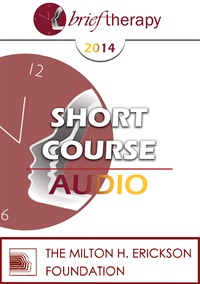BT14 Short Course 24 - Effective Management of Chronic Anxiety and Depression with Essential Neurobiological Communication - Bart Walsh, MSW
- Average Rating:
- Not yet rated
- Topic Areas:
- Anxiety | Depression | Short Courses | Communication | Neurobiology | Brief Therapy | Trauma
- Categories:
- Brief Therapy Conference | Brief Therapy Conference 2014
- Faculty:
- Bart Walsh, MSW
- Duration:
- 1:31:46
- Format:
- Audio Only
- Original Program Date:
- Dec 11, 2014
- License:
- Never Expires.
Description
Description:
There are multiple explanations and theories to explain the creation of anxiety, depression and trauma creation. Many emphasize pathology, permanence of conditions and use multi-syllable words and encourage medical interventions to treat symptoms. This paradigm is often not effective for improving the lives of individuals treated. This course looks at non-medical underpinnings to conceptualize the creation of anxiety, depression and trauma. This conceptualization when understood by the clinician; makes them a better facilitator and co-creator in the treatment process. A natural, holistic understanding also empowers the clinician and client and moves all parties involved closer to health.
Educational Objectives:
- List three common threads of anxiety, depression and trauma.
- List two questions to elicit hope and optimism for clients.
- Describe anxiety, depression and trauma in a non pathological way.
*Sessions may be edited for content and to preserve confidentiality*
Credits
Faculty

Bart Walsh, MSW Related Seminars and Products
Bart Walsh, MSW is a Licensed Clinical Social Worker and Diplomate in Clinical Social Work. He has practiced in the Portland area since 1987, maintaining the highest professional ethical standards. He directs Affinity Counseling and Hypnosis as well as The Milton H. Erickson Institute of Portland. Bart's orientation to counseling, psychotherapy and hypnotherapy is essentially a strengths perspective with a solution focus. The strengths perspective acknowledges all the strengths, resources and instinctual imperatives within an individual that have helped the individual get to the present moment. The strengths perspective helps scan for the resources needed to resolve or modify the concern that is brought to treatment.


